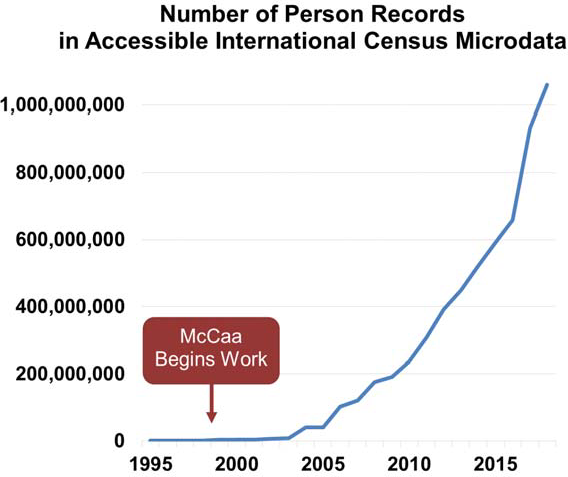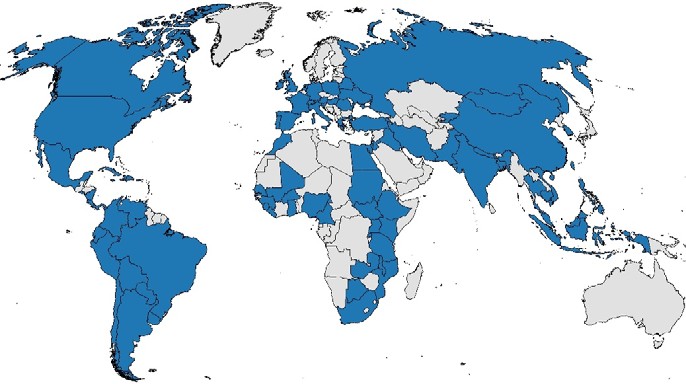 Bob McCaa – 2018 Laureate
Bob McCaa – 2018 Laureate
The IUSSP Council elected Bob McCaa as the 2018 IUSSP Laureate in recognition of the crucial role he has played at IPUMS in centralizing, conserving and providing public access to detailed individual-level population data from all over the world.
For more details on Bob MacCaa's accomplishments and contributions to the population field please read the letter of nomination.
The IUSSP Laureate was awarded to Bob McCaa during a ceremony that took place during the PAA 2018 Annual Meeting on Wednesday 25 April. The ceremony included speeches by Steven Ruggles, Albert Esteve, David Lam and others.
Nomination letter for Bob McCaa
We are honored to nominate Robert McCaa, University of Minnesota Research Professor, for an IUSSP Laureate Award.
McCaa has been a member of IUSSP since 1970. Following training in demographic methods at the University of Pennsylvania Population Studies Center and the Cambridge Group for the History of Population and Social Structure, McCaa received his PhD in History from UCLA. From the early 1970s to the late 1990s, McCaa’s work focused mainly on Latin American historical demography. He produced classic articles on marriage and fertility in 18th and 19th century Chile and Mexico, the role of smallpox in the demographic catastrophe of the 16th century, paleodemography, the demographic impact of the Mexican Revolution, and the household composition of the Nahua (Aztec) of ancient Mexico.
In the mid-1990s, McCaa had an idea that shifted the trajectory of his career and profoundly affected the field of population studies. He had been working on the IPUMS project, which was then a harmonized series of microdata samples from nine U.S. decennial censuses. With harmonized codes, consistent record layouts, and integrated documentation, IPUMS greatly simplified use of the microdata for analyzing long-run demographic change.
McCaa had a radical idea: IPUMS should be expanded to cover international censuses. McCaa’s colleagues were uniformly skeptical, believing IPUMS was feasible only because the U.S. microdata were in the public domain. In the mid-1990s, most countries used census microdata solely to produce aggregated statistics. The only other countries with official census microdata products were Canada and the United Kingdom, which offered tiny samples restricted to researchers in those countries. A few U.S. researchers had obtained access to Brazilian microdata, and a group of Norwegian researchers were using Norwegian census microdata. Except for a few scholars with personal ties to a member of a national statistical office, other potential researchers were effectively locked out, and comparative research using census microdata for multiple countries was virtually impossible.
Despite the skepticism of his colleagues, McCaa persisted. The first breakthrough came in late 1997, when McCaa reached an agreement with the Departamento Administrativo Nacional de Estadistica (DANE), the Colombian census authority, to create an integrated public-use data series for the Colombian censuses of 1964, 1973, 1985, 1993, and 2000. McCaa obtained funding for the project from NICHD, and the Colombian microdata project launched in 1999. Next, McCaa concluded agreements with France, Kenya, Mexico, and Vietnam, and, with funding from the National Science Foundation, the IPUMS-International project expanded to Europe, Africa, and Asia.
Eventually McCaa transformed the terrain of international census microdata research by persuading over 100 statistical offices to allow their census microdata to be disseminated by a third party. Remarkably, all these countries agreed to a single standard license with no special conditions for access beyond the standard approval process conducted by IPUMS. The project, which has been continuously supported by both NSF and NICHD since 1999, is now the largest microdata archive in the world. IPUMS-International disseminates data from 303 censuses of 83 countries, with a combined total of 631 million records. By 2018, IPUMS expects to be distributing microdata on over a billion individuals residing in 100 different countries.
 These census microdata have had a profound impact on population studies and social science generally. More than 20,000 investigators have created 75,000 customized datasets, usually pooling data from multiple censuses. The IPUMS online data analysis tool is used about 100 times a day, and on average a new publication using these data appears every 28 hours.
These census microdata have had a profound impact on population studies and social science generally. More than 20,000 investigators have created 75,000 customized datasets, usually pooling data from multiple censuses. The IPUMS online data analysis tool is used about 100 times a day, and on average a new publication using these data appears every 28 hours.
IPUMS-International has become an indispensable tool for the United Nations, the World Bank, and statistical agencies worldwide. IPUMS-International will play a central role in the estimation of Sustainable Development Goals. Cross-national and cross-temporal microdata allow us to investigate the unfolding transformations of the world’s population. Microdata are vital for understanding powerful large-scale trends such as economic development, urbanization, fertility transition, migration, population aging, and mass education. These data are also uniquely suited for assessing the consequences of social, economic, and demographic transformations in such diverse areas as family structure, economic inequality, and cultural diversity and assimilation. By creating a framework for locating, analyzing, and visualizing the world's population in time and space, these data provide unprecedented opportunities to investigate the agents of change, assess their implications for human society and the environment, and develop evidence-based policies to meet future challenges.
The international research community owes McCaa an enormous debt of gratitude. He has been directly instrumental in the public release of more population microdata than any other person. Due to McCaa’s dedication to the principle of data liberation, researchers today have access to a massive body of detailed individual-level data.
McCaa’s work has multiplied the total quantity of microdata available for demographic research by more than an order of magnitude. All these data are available free of charge to researchers and educators around the world through the IPUMS data system. This is an astonishing achievement.
IPUMS Participating Countries

It is hard to overstate the difficulty of what McCaa has achieved. Statistical office directors often have little concern for microdata, viewing summary tabulations as the primary product of the census. Many directors required years of convincing, through numerous contacts and at multiple venues, before they appreciated the value of these data for researchers and would entrust an American university-based organization with their national statistical treasures. McCaa worked tirelessly, flying millions of miles, going to dozens of international meetings and census offices, giving papers and growing networks of academic and official statistician allies. He has attended international data confidentiality meetings across the globe, consistently representing the interests of researchers in retaining as much category detail as possible. Those who are familiar with McCaa know how relentless he can be, and how skillful a salesman he is. Population researchers can be thankful that a person with this rare combination of research and social abilities was positioned to take action at the historic moment when a global microdata revolution proved possible.
Perhaps because of his historical training, McCaa takes the long view when it comes to population data. The oldest data are not only as valuable as the most recent but are also at greater risk of loss. McCaa’s preeminent contribution might well lie in his commitment to data preservation. As he scours the world, he always enquires about old census data that statistical offices may still retain. When old tapes were discovered that could no longer be read by the office, McCaa had them shipped to where they could be read and preserved. He has arranged to have entire archives of data migrated to modern media to prevent their loss. Numerous censuses from the 1960s to the 1980s would already be gone without his efforts, as attested by the frequent requests to IPUMS from statistical offices for copies of the data they once provided but subsequently lost. The older censuses represent the lives of millions of people, many of whom are not captured in other records. McCaa’s efforts have retained the history of these respondents, and have also secured the latest rounds of census data for cutting-edge policy research.
McCaa preserved and shared a vast body of microdata dating from the past half-century. This represents a permanent and substantial addition to the world’s statistical heritage. McCaa’s prescient vision and tenacious effort has already directly resulted in thousands of research articles, PhD dissertations, and books, and we can anticipate that the ongoing torrent of new investigations will continue to flow for many decades to come. These data have opened new paths to investigate variation in demographic behavior across time and space. Only a few population scientists have had such a powerful impact on research spanning many disciplines across the globe. In recognition of all these contributions, we urge you to recognize Robert McCaa as a worthy recipient of an IUSSP Laureate Award.
Steven Ruggles, Regents Professor, Director, Minnesota Population Center, University of Minnesota
Albert Esteve, Director, Centre d’Estudis Demogràfics, Universitat Autònoma de Barcelona
